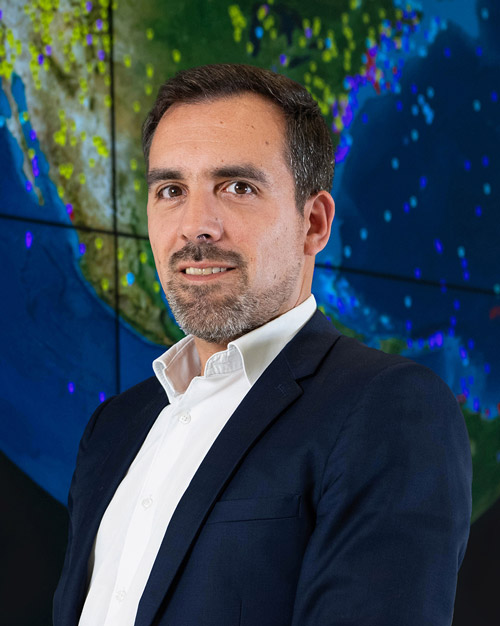CLS, world leader in satellite-based maritime security, announces the signature of three major contracts with the governments of India, Sri Lanka and Thailand for the supply of its state-of-the-art Maritime Awareness System (MAS), a unique real-time solution for the detection and surveillance of threats at sea.
The company has also just acquired the Brazilian company SAT ONE, specialized in merchant fleet tracking and support for offshore activities.
Thanks to these strategic contracts and acquisitions, CLS has strengthened its position as a world leader in maritime surveillance. With sales of €173 million and 900 employees, CLS uses over 300 satellites in its security services, and state-of-the-art AI to detect suspicious activity.

MAS: Cutting edge maritime Intelligence
CLS’ Maritime Awareness System (MAS) is a unique service for detecting and monitoring threats at sea, already used by French Customs and Navy as well as Ecuador. Relying on artificial intelligence technologies, a large volume of heterogeneous data is processed, accelerating decision-making with valuable information.
David Bajouco, Director of Maritime Safety at CLS: “Our MAS system, the fruit of 30 years’ experience and expertise, guarantees constant, proactive surveillance of maritime activities, helping to strengthen the security and sovereignty of marine territories, while contributing to the protection of ocean resources. We are proud that this cutting-edge service has been recognized as a public utility by many nations, and we thank the governments of Sri Lanka, India and Thailand for their trust.“
 Sri Lanka chooses CLS to help combat oil pollution
Sri Lanka chooses CLS to help combat oil pollution
Located at the crossroads of major shipping routes, Sri Lanka is facing growing environmental risks. CLS is working with the Sri Lankan authorities on the OSDS (Oil Spill Detection Sri Lanka) project.
This innovative project deploys an offshore oil spill detection service, delivered by CLS, to identify potential polluters and reduce the environmental impact of human activities at sea. This tried-and-tested detection system has proved its worth in various regions of the world that have placed their trust in CLS. In Europe, for example, the CleanSeaNet service operated by EMSA has enabled the number of pollutions detected in European waters to be halved in 10 years, thanks to its deterrent effect.
CLS joins India’s commitment to enhanced maritime surveillance

India, a major strategic maritime nation, also has several reasons for strengthening the security of its waters. First and foremost, it must protect its national interests: as a country bordering the Indian Ocean, India has major economic, geopolitical and strategic interests in this region. Ensuring its maritime security is essential to protect its marine resources, vital lines of communication, offshore installations and key trade routes. Against this backdrop, India has to deal with multiple threats, in the Indian Ocean, including piracy, maritime terrorism, smuggling, human and drug trafficking. The world’s most populous country also must watch its borders.
Illicit activities and terrorism can be facilitated by maritime routes. Increased maritime surveillance enables India to protect its coastal borders against infiltration and maintain internal security. From an environmental point of view, the stakes are just as high. India relies heavily on marine resources for food, energy, fishing and the economy. Enhanced maritime security ensures the protection of its resources against illegal fishing, pollution and other harmful activities. Environmental disaster prevention is also key. The risks of marine pollution, oil spills and shipwrecks require continuous monitoring to ensure a rapid and effective response in the event of an emergency.
Improved maritime safety helps minimize the environmental consequences of such disasters. And finally, India plays an active role in regional and international affairs as a member of the Indian Ocean and the BRICS group. By strengthening its maritime security, India reinforces its position and ability to collaborate with other countries on security and development initiatives.
To protect India’s national interests, manage diverse threats and maintain stability in a region where the stakes are varied and complex, the government, as part of a Franco-Indian cooperation involving the French Space Agency (CNES), called on CLS to deliver a complete satellite-based maritime domain surveillance center, surveillance system (MAS © CLS), data center and analyst training. India is changing scale and positioning itself as a strategic player in terms of maritime security in the Indian basin, equipping itself with cutting-edge technology delivered by CLS.
India, as a major maritime power, now benefits from CLS’ MAS solution, and thanks to this strategic contract the French company provides India with an integrated system for in-depth analysis of maritime data in real time, facilitating the detection of potential threats and the protection of its territorial waters.
 Thailand calls on CLS for Integrated Maritime Security System
Thailand calls on CLS for Integrated Maritime Security System
Thailand is also taking a proactive approach to the surveillance of its territorial waters by partnering with CLS to implement the MAS system.
This solution will enable Thailand to effectively monitor its territorial waters and ensure the safety of its marine resources, while contributing to the fight against illicit activities at sea.
Acquisition of SAT ONE in Brazil: Strengthening local expertise

CLS’s position as a leader in maritime safety is also reflected in its international reach.
CLS is proud to announce that it is extending its expertise and network in this field by acquiring SAT ONE, a Brazilian company specializing in maritime surveillance and offshore activity management. Sophie BESNARD, Director of International Affairs for the CLS Group: “This acquisition strengthens CLS’ presence in Brazil, a strategic market for the company. More than 10 new employees will join its Brazilian subsidiary PROOCEANO, which is taking advantage of this growth to become CLS Brasil. The Portuguese-speaking company, which now has almost 50 employees, operates in the fields of maritime safety, environmental monitoring and support for energy and infrastructure-related activities“.
With this acquisition, CLS, which has been monitoring all European-flagged vessels on behalf of Europe since 2008, is now monitoring the Brazilian fleet on behalf of the national authorities. Through these contracts and this acquisition, the company enables Europe and Brazil to know the position of their vessels on all the world’s seas at all times.

CLS world leader in satellite-based maritime security
Christophe VASSAL, Chairman of the CLS Group: “These strategic advances position CLS as a key player in global maritime security. With innovative solutions and international reach, CLS continues to play a leading role in preserving the oceans.”



